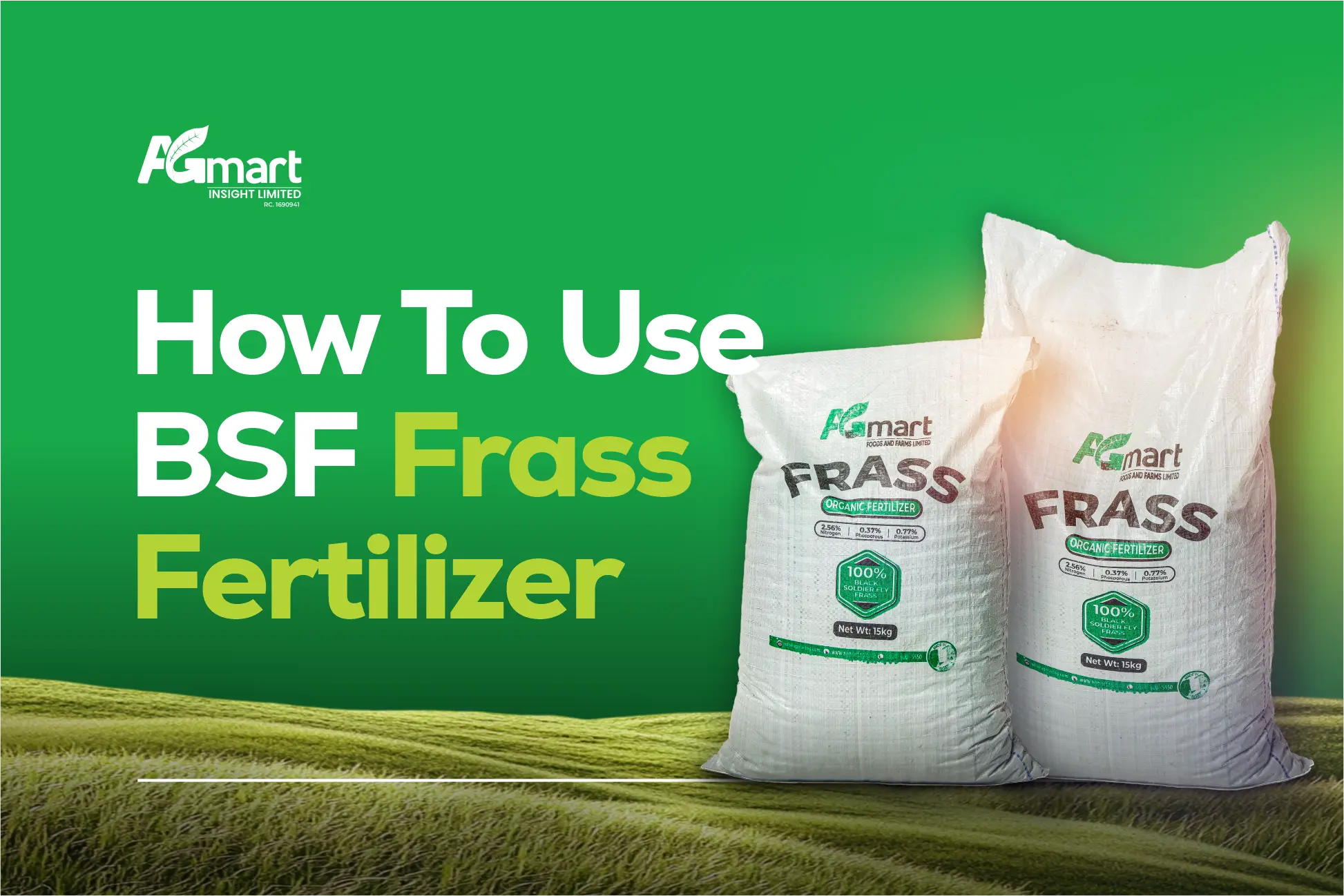Many Nigerian farmers struggle with declining soil fertility, often without realizing that years of chemical fertilizer use are part of the problem. Chemical fertilizers may boost yield in the short term, but gradually weaken the soil, reduce microbial activity, and harm the environment.
The dangers of chemical fertilizers to the soil, crops, human health, and the ecosystem have risen over the years, and the advocacy against these chemical fertilizers to human health and crops has been lodged by doctors, farmers, and even consumers.
That’s why more farmers are switching to Black Soldier Fly (BSF) frass fertilizer. A natural, organic soil enhancer made from the by-product of BSF farming. BSF frass is packed with nutrients, beneficial microbes, and chitin, which help plants grow stronger and resist pests and diseases.
In this guide, you’ll learn step-by-step how to use BSF frass fertilizer before planting, during planting, as top dressing, and for compost enrichment. You’ll also get tips on storage, dosage, and answers to common farmer questions, all based on real research and tested results from Nigerian farms.
What Exactly is BSF Frass Fertilizer
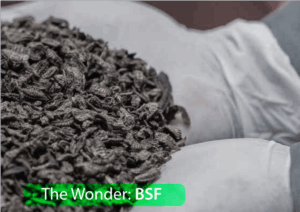
BSF frass fertilizer is what is left after black soldier fly larvae consume organic waste such as farm residues and food scraps. What’s left behind is a nutrient-rich mix of digested matter and microbial life that enriches the soil naturally.
Unlike chemical fertilizers that only feed plants temporarily, BSF frass fertilizers nourish the soil itself by retaining moisture, improving soil structure and aiding microbial balance, all of which are long-term benefits of soil and crop health.
According to the Food and Agriculture Organization(FAO), organic soil enrichments like BSF frass fertilizers do more than enrich the soil, they also reduce farmers’ dependence on expensive synthetic fertilizers.
Why Nigerian Farmers are Turning To BSF Frass Fertilizers
Here’s why more local farmers, from vegetable farmers in Ogun state to maize growers in Kaduna, are switching to BSF frass:
- Affordable and locally produced: it’s made right here in Nigeria, saving local farmers money by cutting down on importation costs.
- Improves soil health over time: it enhances microbial activity of the soil, nourishing the soil with essential nutrients, thereby boosting soil health over time
- Safe for all crops: BSF frass is safe for arable and vegetable crops and produces healthier organic crops
- Eco-friendly: it turns food waste into organic fertilizer, reducing environmental pollution.
You can learn more about the benefits of BSF frass fertilizers in our previous post: Benefits of BSF Frass Fertilizers for Nigerian Farmers
How To Use BSF Frass Fertilizer Effectively
One of the easiest ways to make your crops thrive naturally is by using Black Soldier Fly (BSF) frass the right way. It’s not about pouring it everywhere, it’s more about timing and balance. Think of frass as a small energy source that keeps your soil alive long after you’ve planted.
Here’s a simple guide on how to use BSF frass fertilizer before planting, during planting, as top dressing and for compost boosting as a small farm owner:
A. Before Planting – How to Apply BSF Frass to Your Soil

- Use 1 cup of frass per square meter of land
- Mix it into the top layer (2-3 inches) of soil
- Water lightly after mixing
This translates to about 10-12kg of frass per acre. If you’re using a hoe or tiller, just scatter lightly. There’s no need to bury it deep.
B. During Planting – Using BSF Frass for Seed or Transplant Growth
- Use 2 tablespoons (⅛ cup) of frass per planting hole for vegetables or small crops.
- For larger crops like maize or cassava, use ¼ cup per hole.
- Mix it with a bit of soil before placing the seed or seedling to prevent root burn.
This small amount releases nutrients gradually without overwhelming the roots.
C. Top Dressing (Mid-Growth Stage)
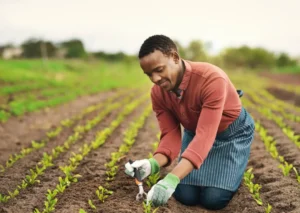
- For smaller plants, sprinkle ¼ to ½ cup of frass around the base.
- For larger fruiting plants, use 1 cup per plant every 3–4 weeks.
- Lightly mix it into the soil or cover with mulch, then water.
This keeps soil microbes active and boosts nutrient availability during peak growth.
D. Compost Boosting – Enhancing Compost with BSF Frass
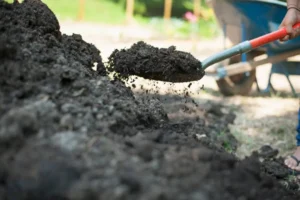
- Add ½ cup of frass per 10 kg of compost material.
- Mix thoroughly and keep compost moist but not wet.
Frass contains microbes that speed up decomposition and add trace minerals (NPK + chitin).
All suggested amounts are estimates based on scientific-approved research from Frontiers in Plant Science 2020 & 2021, and TAAT-Africa fertilizer application guidelines.
Pro-tip: Always start small, especially on new soil. Frass is potent, and even small doses improve soil structure and microbial life over time. You can increase gradually after observing results over one planting cycle.
How to Store BSF Frass Fertilizer to Preserve Its Quality
- Keep it dry: Store frass in a covered, ventilated and dry area off the ground. Moisture can cause odours or spoilage.
- Use with 6 – 12 months for best microbial activity
- Handle with gloves like any organic material. BSF frass has low pathogen risk, but basic hygiene is smart.
Frequently Asked Questions About BSF Frass Fertilizer
1. Can I mix BSF frass with other fertilizers?
Yes, you can. BSF frass works well alongside compost or biofertilizers. However, mixing it with chemical fertilizer may reduce its microbial benefits.
2. How long does it take to see results?
Farmers noticed improved soil texture and greener crops within 3 – 6 weeks of consistent use and better yield by harvest season. Trials showed better yield of maize in one season.
3. Is BSF frass safe for edible crops?
Absolutely. Since it’s organic and chemical-free, it is ideal for vegetables, fruits and grains.
4. Can BSF frass fertilizer help with pest control?
Yes. The chitin content in BSF frass helps plants naturally resist pests and soil-borne diseases, reducing the need for pesticides.
5. How does it compare to poultry manure or compost?
While poultry manure adds nutrients, BSF frass adds nutrients and beneficial microbes and enzymes that strengthen root systems.
6. What is the NPK ratio of BSF frass?
The average NPK ratio falls within 3:1:2 to 4:2:3.
This means it’s a mild, slow-release organic fertilizer, rich in nitrogen for leafy growth, moderate in phosphorus for root development, and strong in potassium for fruiting and disease resistance.
How Agmart’s BSF Frass Fertilizer Fits In
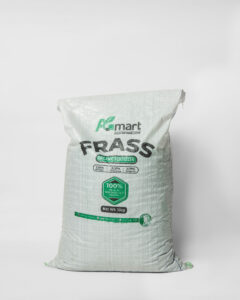
At Agmart Foods and Farm Limited, we’re helping Nigerian farmers grow sustainably with organic, locally made BSF frass fertilizer. Our frass is nutrient-tested, proven to boost yield, and designed for Nigeria’s unique soils and crops.
Start small and see the difference:
- Vegetables: Apply 30–50 g per transplant hole
- Maize or grains: Use about 2.5 t/ha as a pre-plant mix
Every bag of Agmart BSF Frass helps you rebuild your soil, reduce costs, and grow healthier, more resilient crops.
Ready to improve your yield the Agmart way?
Order your BSF Frass Fertilizer today and start seeing results this planting season.
👉 Order Now at Agmart Foods & Farm Limited or visit our homepage to learn more about our sustainable farming solutions.

